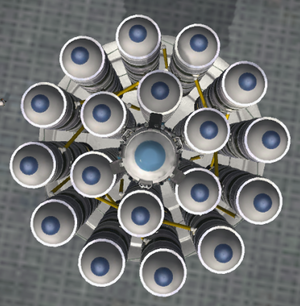Difference between revisions of "Asparagus staging"
(→Current Disadvantages) |
(Sorry, but I can't find any reference to the terms "Chocolate box staging" or "atom popping" anywhere. When these terms are really used in the community, please provide a source.) |
||
| Line 13: | Line 13: | ||
The biggest disadvantage of this technique is that it has a very stupid name. Both players and developers have expressed their disdain for the term. Unfortunately, no better name has been found yet. | The biggest disadvantage of this technique is that it has a very stupid name. Both players and developers have expressed their disdain for the term. Unfortunately, no better name has been found yet. | ||
| + | |||
Chocolate box staging has been proposed as an alternative, as one tends to eat one layer of chocolate before cracking into the lower layer, while simultaneously jettisoning the unneeded stage, much like throwing out the gross chocolates nobody wants. | Chocolate box staging has been proposed as an alternative, as one tends to eat one layer of chocolate before cracking into the lower layer, while simultaneously jettisoning the unneeded stage, much like throwing out the gross chocolates nobody wants. | ||
Revision as of 09:16, 5 March 2013
Asparagus staging is a method to build very efficient rockets.
The idea is that you create a rocket with a lot of parallel rocket engines with fuel tanks on top of them. All engines ignite at the same time. The trick, however, is that each rocket engine isn't depleting its own tank, but they are all draining their fuel from the two outmost tanks. When these are depleted, the outmost tanks with their engines are decoupled and the next fuel tank takes over which is still completely full. The result is that the rocket always flies with the minimum number of tanks required to transport the fuel it has left while also constantly using all engines it has on board.
This concept can be realized through fuel ducts which connect the stages in the order they will be dropped. It exploits the fact that engines will always take their fuel from the most distant fuel tank available.
The stock vessel "Kerbal X" demonstrates this technique.
Current Disadvantages
The biggest disadvantage of this technique is that it has a very stupid name. Both players and developers have expressed their disdain for the term. Unfortunately, no better name has been found yet.
Chocolate box staging has been proposed as an alternative, as one tends to eat one layer of chocolate before cracking into the lower layer, while simultaneously jettisoning the unneeded stage, much like throwing out the gross chocolates nobody wants.
Asparagus staging appears to be de rigeur for the foreseeable future as it is widely understood as a shorthand for a really complex system, much like the Kerbals love of calling nuclear fission by its more common name, atom popping.
Future Disadvantages
Asparagus staging benefits a lot from the inaccurate way KSP is modeling atmospheric drag in the current version (0.18.4). Currently, each part of a vessel generates drag proportional to its mass, regardless of how it is placed and how much of its surface area is exposed to the direction of the airflow (yes, that means all the Aerodynamic Nose Cones you put on your rockets just slowed them down even more). The developers have already announced that the aerodynamic model will be made more realistic in future versions, which will likely mean that the wide, flat designs of asparagus-staged crafts will generate a lot more atmospheric drag than slimmer designs with vertical staging.
The new atmospheric drag model is unlikely to make asparagus staging completely obsolete as there is a planned real-life rocket which uses this method with one stage [1], but it will likely make it a lot more challenging to create aerodynamic crafts which use this technique excessively.

